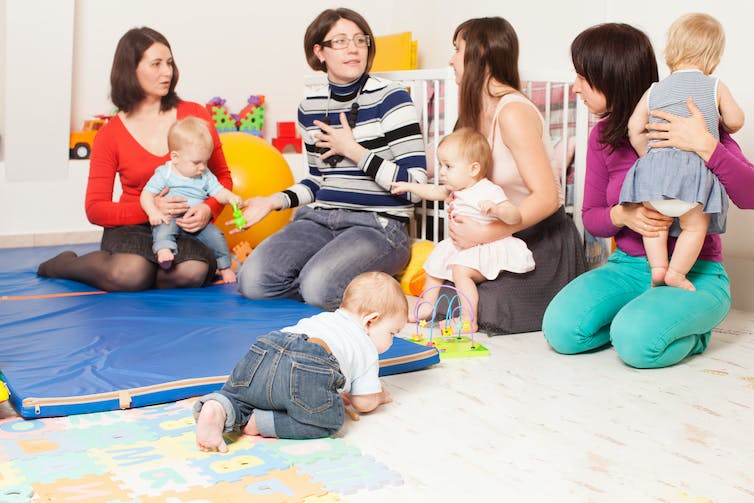Rawpixel.com/Shutterstock
Playgroups could be a lifeline for brand new dad and mom. Run by volunteers, they provide younger youngsters an area to discover and work together with others, and fogeys an opportunity to have a cup of tea and a chat.
This was actually the case for me. Having low moments following the beginning of my youngsters, as one in 5 girls might do, these playgroups helped me make connections with different dad and mom and carers. They led to new buddies for my youngsters and offered a protected house to go on tough days.
I witnessed first-hand the worth of those teams, and the integral position volunteers fill in communities. But, in response to charity Early Years Scotland, community-based playgroups are “struggling to outlive” as a consequence of a lower in volunteers.
Now, I’m researching the worth of playgroups for households and communities, understanding what position they play within the first years of parenthood, and the way that may contribute to neighborhood wellbeing and resilience.
Building neighborhood
Playgroups have been a staple a part of communities within the UK for the reason that Seventies. They create a way of belonging for the individuals who attend and assist dad and mom construct their parenting abilities in addition to develop connections, which enhance their psychological wellbeing.
Playgroups are additionally a spot the place dad and mom can take a primary step into volunteering, studying abilities that may permit them to go on to take additional management roles of their wider neighborhood. And playgroups can have financial advantages, if volunteers achieve data and confidence that they’ll take into paid employment.
However, there was an general discount in volunteering throughout the UK for the reason that pandemic, regardless of the outstanding grassroots efforts witnessed throughout lockdowns.
Early Years Scotland has attributed the lower in volunteers partially to a rise in working hours. Parents might have additionally been returning to work earlier after parental go away on account of the price of dwelling disaster, leaving much less time to become involved with playgroups.
During lockdown, inside group actions like playgroups had been unavailable. But I noticed volunteers innovating: shifting exterior and creating new areas, such because the Scottish Buggy Club.
My personal native playgroup moved to out of doors amenities at an area farm. Activity teams such because the charity group Fun First moved on-line for his or her courses.
Still, for a lot of households, the pandemic was a really isolating expertise. Research reveals that oldsters of younger youngsters suffered – specifically girls and lower-income dad and mom.

Playgroups give dad and mom a spot to attach.
Oksana Shufrych/Shutterstock
Now, the price of dwelling disaster is limiting alternatives for actions with youngsters. As winter looms, extra dad and mom shall be caught inside with babies with nowhere to go. We know that single dad and mom are notably inclined to social isolation.
We are prone to dropping neighborhood teams that create alternatives for his or her members to ascertain “thick networks”: collaborations between native folks that create a welcoming and helpful native tradition.
To assist households, assist volunteers
Recent coverage initiatives from the Scottish and UK governments have targeted on households. There is an effort in Scotland to concentrate on community-based responses to maintain neighborhood wellbeing.
But there have been complaints that assets will not be being seen at a neighborhood stage, the place funding is reducing and there may be not sufficient help for volunteers.
In the short-term, options would come with extra assets to help volunteers – coaching, incentives and neighborhood funding, which is able to improve their position and encourage volunteers to remain of their position for longer. But the lower of volunteers is extra basic that this.
Long-term methods are wanted if governments want to depend on the providers supplied to native communities by the members of that neighborhood. These embrace encouraging companies and industries to noticeably think about the wealth of analysis that reveals versatile working, job shares and four-day weeks are useful for the financial system, productiveness and wellbeing. With extra time, extra individuals might be capable to assist out in locations like playgroups.
Finally, introducing a common fundamental revenue, such because the participation revenue mannequin – which requires that folks contribute to their neighborhood as a way to obtain revenue – might assist individuals to tackle neighborhood and voluntary roles and instil a wider sense of wellbeing within the inhabitants.
![]()
Ruth Lightbody works for Glasgow Caledonian University. In 2023 she has been awarded funding from the British Academy/Leverhulme Small Research Grant to analysis playgroups and resilient and wellbeing communities.
